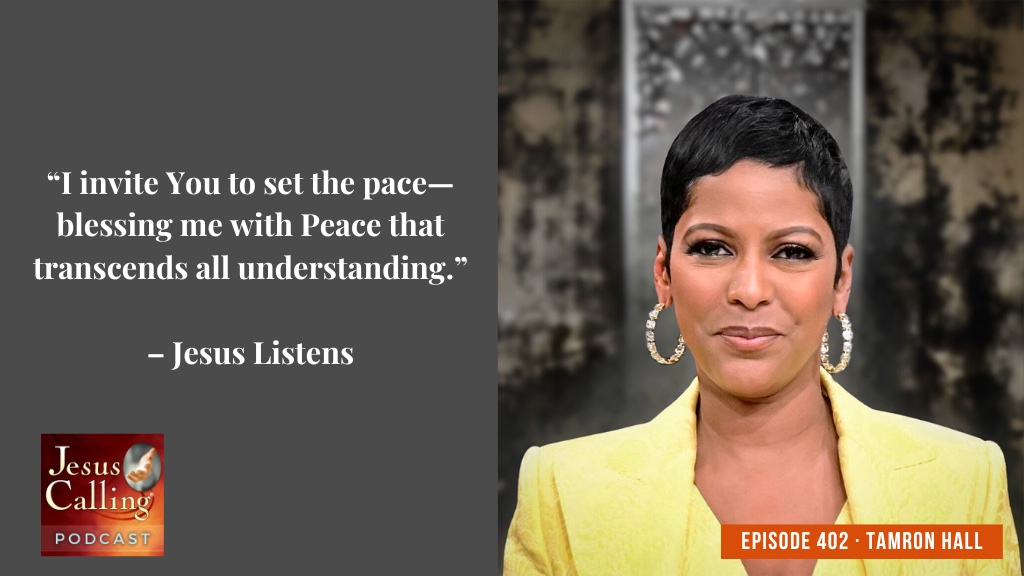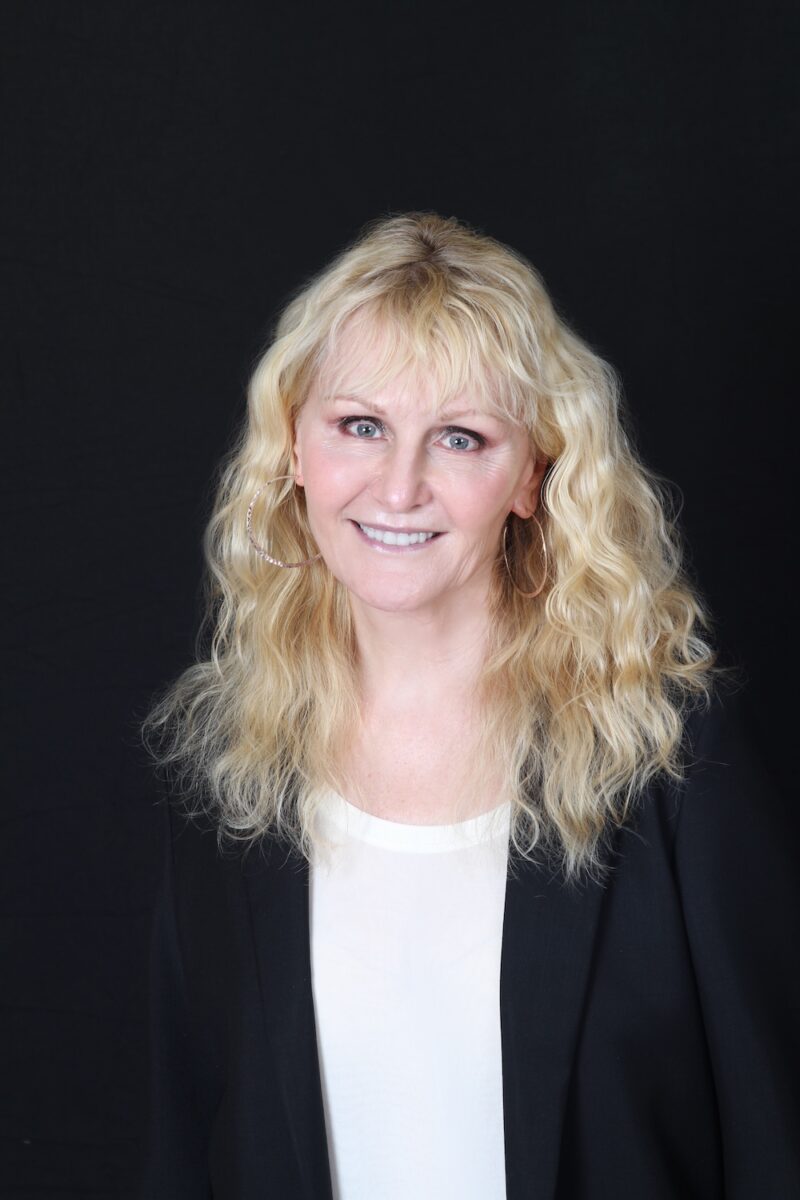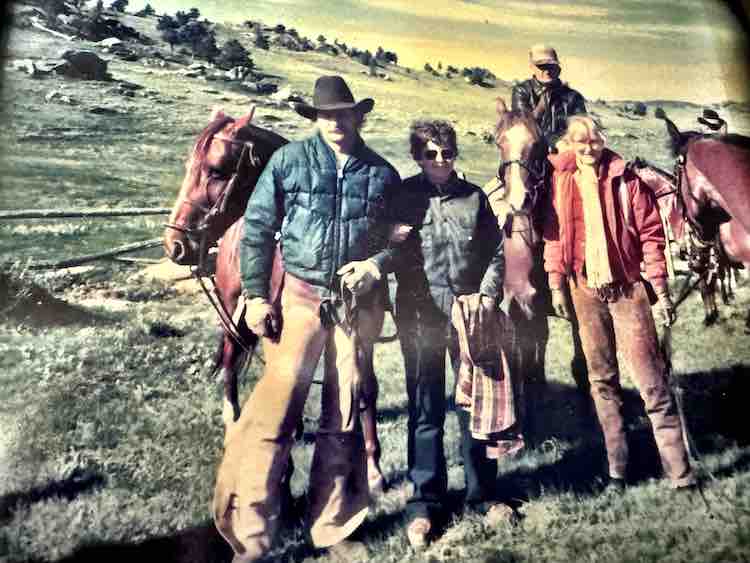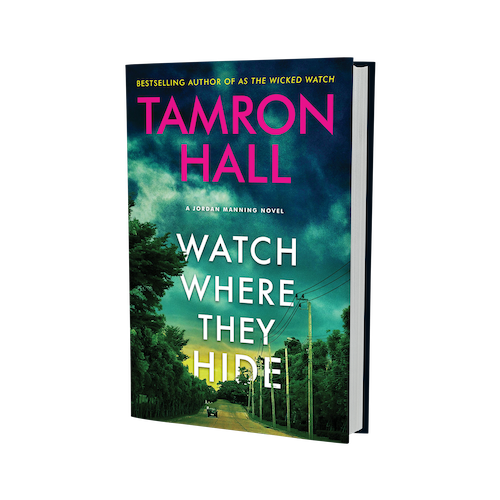Losing Hope? Turn to God: Tamron Hall & LaRae Quy

Tamron Hall: God does give us free will, and God does provide for us, but gives us the ambition and the drive to make our dreams come true.
Losing Hope? Turn to God: Tamron Hall & LaRae Quy – Episode #402
Narrator: Welcome to the Jesus Calling Podcast. When we face darkness in our lives that threatens to overwhelm us, it can feel like it’s harder and harder to find any light. But in Hebrews 6:19, it says “We have this hope as an anchor for the soul, firm and secure.” That anchor is Jesus—and He is waiting to hear our cares and concerns, and is present to be that rock we can cling to in every trial we encounter.
This week, our guests talk about how they turned to Jesus when they started to lose hope in humanity. Talk show host and author Tamron Hall had periods in her life where her job took a toll on her mental health, and when she asked God to help her see the good in humanity again, she was able to find a renewed passion for helping others. LaRae Quy, a former FBI agent and spokesperson, faced the harsher side of humanity during her twenty years as an undercover and counterintelligence agent. Hearkening back to the lessons of patience and perseverance she learned growing up on a Wyoming ranch, she reached out to God to bring peace to her mind, which was haunted by the hurts she had seen perpetrated on so many victims in the cases she covered.
Let’s begin with Tamron’s story.

Tamron: My name is Tamron Hall. I am the author of the Jordan Manning series. The latest is Watch Where They Hide. I’m also a nationally syndicated talk show host, an Emmy Award-winning talk show host and a journalist for over thirty years, and a mom and a friend.
I grew up in Luling, Texas, which is in Hill Country right outside of Austin. From the small town where I was raised—right outside of Dallas-Fort Worth in a very, vibrant, loyal family structure—celebrating each other and rooting for each other, all led to the life I live now. I was always told that I could do anything, that all of it was achievable if I did the hard work, if I stood up for myself, I stood up for what I believe and stand up for others in the process. And so that led me to a career in journalism, one of the ultimate places that you can stand up and hopefully fight for and alongside people.
After many years of being a local reporter and a national reporter, it led me to where I am today, my daytime talk show. And from that show I decided leaps of faith and taking your chance and not limiting yourself is an important part of the journey. I wanted to really pull back the curtain on what it’s like to be a reporter, what it’s like to go home and not be able to forget some of the unimaginable things you witnessed. And that led me to hosting a very popular crime series called Deadline Crime.
A Career in Crime Reporting Brings Emotional Distress
I openly discussed, a few years after my sister’s death, that it was the result, potentially, of domestic violence and was deemed an unsolved crime. And while we never learned through the court system who did it or who was responsible, I had witnessed an incident that she shared where she was the victim of domestic violence.
And so that deeply connected me to what I think sometimes we can forget when it comes to true crime, especially now with it being such a fascinating genre—whether it’s books or streaming or docuseries or podcasts—and remind people of what was lost and what was changed forever. So Deadline Crime became my launch into a more intimate style of true crime reporting. I was able to sit more intimately and spend more time and go into the homes and really connect on a far deeper level.
You’re never prepared, as a young journalism student, to see a dead body inches from you, while you’re holding your microphone and you’re trying to stay focused on your report, but you know that there’s a human life that’s been ended behind you. There’s no school that can prepare you for a parent handing you the kindergarten photo of their child who’s just been found dead and looking to you for comfort, but also believe that you are going to care for them while telling their story and not use it as an opportunity just to get people to watch TV. This became a point of pride that I was able to do this show, but it started to impact my mental health in many ways.
“There’s no school that can prepare you for a parent handing you the kindergarten photo of their child who’s just been found dead and looking to you for comfort, but also believe that you are going to care for them while telling their story and not use it as an opportunity just to get people to watch TV.” – Tamron Hall
There was this case I covered in Oklahoma where a mom was murdered. She was pregnant, and she and her unborn child were the victims of a serial killer. And I was pregnant myself at the time, and it just left me very disoriented and very conflicted about everything at that point, about people, about life, and [it was] just a lot. Ultimately, it pushed me to decide that I needed a break from Deadline Crime.
When God Sends You on the Long Route
Just yesterday in my church, the whole sermon was about the long way, right? Our minister talked about the children of Israel leaving in the book of Exodus and having to go through the wilderness. And there was a shorter path, but that is not the path that they were led to, and why the long route is the route and what you need to learn in the long route.
And a lot of the things that are happening for me in my career at this point have happened past the age of forty-five, which in my business traditionally, I mean you’re probably on your way out versus on your way up. And for me, I sat with that sermon. What does God want you to learn by sending you on the long route? And I think a couple of things for me have become so clear. While the talk show was a point of great accomplishment, it allowed me also to know that there’s more, right?
I lost my dream job before the public nationally, but I knew it was in God’s hands, and I knew that I didn’t need to do anything other than find peace with it and find my lane. So faith has been a foundation. I think it keeps me peaceful. I think it keeps me from even those moments where I want to run down the street and scream at the top of my lungs. It provides perspective because I do believe these things happen for a reason.
“I lost my dream job before the public nationally, but I knew it was in God’s hands, and I knew that I didn’t need to do anything other than find peace with it and find my lane.” – Tamron Hall
You pray and you have faith and it’s not happening. It doesn’t happen a second time around, a third time, and then you start to believe, Wait a minute, has God forgotten me? What’s going on here? How do I define myself and the things I want to accomplish? But all along you’re on the path. The win is in the loss. Faith is in the challenge. The uncertainty is supposed to bolster the faith and the belief that it is going to happen in God’s time.
“The win is in the loss. Faith is in the challenge. The uncertainty is supposed to bolster the faith and the belief that it is going to happen in God’s time.” – Tamron Hall
Starting Every Day with Prayers of Gratefulness
I start every morning with prayer. My mother’s prayer spot is her closet and mine, I have this little sliver of space in the corner. But it’s a foundation. The minute I wake my eyes, I say, “Thank you, God.” I don’t know what the day will bring, but I know that I have another day, or at least that moment to be grateful.
When I’m on set, before I walk out of the doors of the show, I ask God to guide me in my words and let me be a comfort if I need to be that for someone, allow me to bring a smile to someone’s face if that’s what they need.
“When I’m on set, before I walk out of the doors of the show, I ask God to guide me in my words and let me be a comfort if I need to be that for someone, allow me to bring a smile to someone’s face if that’s what they need.” – Tamron Hall
There’s so much of life that we can extract the negative, we can extract the difficult days and balloon those up into the total sum of the journey. I truly in my heart believe that it’s not a cliché when we say the good outweighs the bad, and that’s in our own lives. I just recognize that these events are not the total sum of your journey, and that it’s faith that provides the path that gives us perspective.
Narrator: To learn more about Tamron Hall, please visit www.tamronhallshow.com, and be sure to check out her latest book, Watch Where They Hide, at your favorite retailer.
Stay tuned to LaRae Quy’s story after a brief message.
Give the Gift Of The Bible
It goes without saying, but the Bible has changed so many lives. Take a second to think about if you didn’t have access to a Bible or the freedom to own one. This is a reality that many are facing. That’s why I want to tell you about one of our partners, Cru [Campus Crusade for Christ]. Cru has missionaries in almost every country, and they’re seeing people come to know Jesus.
There’s just one thing they’re missing: a Bible in their own language. One missionary said, “I’ve never seen such a thirst for the Word of God in my country.”

For only $24 a month, you can provide three people with Bibles each and every month. When you sign up to provide three Bibles with a monthly gift of $24, as a thank you, Cru will provide meals to 12 hungry individuals through their humanitarian aid ministry. Plus, you’ll receive a free copy of our Jesus Listens devotional. Simply text “Calling” to 71326 to help today.
Imagine just how much this gift could change someone’s life. So text “Calling” to 71326 to help now or visit www.give.cru.org. Messaging and data rates may apply. Available to U.S. Addresses only.
This show/episode is sponsored by BetterHelp.

How is your social battery right now? Do you feel drained? Too much going on?
Perhaps you find that you spend so much time showing up for others, your calendar is making you exhausted. Have you ever considered therapy to help establish those boundaries you need in life when it comes to refilling that social battery and being able to show up in ways that are better for others and yourself?
I know for me, sometimes I can be aware that I need to make a change, but I don’t always have the tools to identify how and where. Therapy empowers you to be the best version of yourself—even when it comes to navigating everyday issues—like when to say no, and when to take a break. If you’re thinking you might benefit from therapy too, give BetterHelp a try. It’s entirely online, designed to be convenient and suited to your schedule. Just fill out a brief questionnaire and get matched to a licensed therapist. Find your social sweet spot with BetterHelp.
Visit www.BetterHelp.com/jesuscalling today to get 10% off your first month.
Our next guest is former FBI agent and spokesperson LaRae Quy. Having seen the harsher side of humanity during her time in the FBI, LaRae began to lose faith in people. Through her faith in God, however, she was able to hang onto hope, even through witnessing so much hopelessness. After she retired, LaRae went to seminary, and now helps lead others to uncover the values that guide them and teach people that we can draw from God’s unending wisdom, no matter what trials we might face.

LaRae Quy: My name is LaRae Quy and I grew up on a remote cattle ranch in the middle of Wyoming, and many of the lessons that I learned on that ranch actually would help me succeed as an FBI agent for about twenty-four years.
Life on a ranch taught me responsibility and to care about other living things and animals, just expand my ability to love. Ranch life also taught me about perseverance.
One of the clearest examples happened when I was about eight years old, and my dad took me with him to help our Uncle Trey herd several hundred head of cattle to summer pasture, and I was just so excited because I would be one of the riders, a real cowboy at eight. And so I was running a mare by the name of Sugar. And that morning we all got up early to start gathering the cattle. And at that age, it was hard for me to throw my fifty pound saddle onto Sugar’s back, but I made it. I got her bridled, and I was all set right along with the other riders, but then I had to get on her. My eye was at the same level as my stirrup. So I needed to find a rock or something I could stand on so I could get on her. So I tried to lead her close to the corral fence so I could jump on, but she just kept shying away. I looked around for my dad to help me, but he had taken off with the rest of the guys and just left me there. I was desperate because pastures in Wyoming are usually over a thousand acres or more, and I was just afraid I’d never find him again. I’m starting to panic.
So this time, when Sugar shied away and she just stood facing me, I jumped onto her head and neck. I grabbed some mane and I just kept swinging my leg until I found the saddle horn and pulled myself into the saddle. By this time, the riders were way in the distance. So I kicked Sugar into a run and I pulled up beside my dad and he didn’t say anything, but he just gave me a quick nod of approval.

It’s good that we can take those experiences from childhood and we learn from them. They’re not always pleasant. It wasn’t fun being left behind, but my dad was teaching me something I didn’t know at the time, tenacity and integrity and perseverance.
From Fashion to the FBI
After I graduated from college, I started working in fashion as a department manager in a very large retail store, but I just hated the job. It was a real low point, but at the same time I experienced a deep stir within my soul. It felt like growth at a subterranean level and it spurred me into action as I fought back to the surface.
So I went back to school for a master’s degree. And when I was there, the FBI came onto campus and interviewed me. And I just think they liked the fact that I grew up on a ranch that I had spunk and grit, and they saw that. And I was hired within a few weeks, which is rare because I was only twenty-five, and the average age of a new agent is about thirty-three. And it takes most people a year or two of waiting to make their way to the top of the queue.
God opened that door and I have no doubt it was the right path for me, because the values of the FBI closely aligned with the values I developed on that Wyoming ranch. And internally, FBI stands for fidelity, bravery and integrity, and those were the same values I learned on the ranch. I could get behind them.
“God opened the door and I have no doubt it was the right path for me, because the values of the FBI closely aligned with the values I developed on that Wyoming ranch.” – LaRae Quy
Digging Past the Surface to Discover the Truth
In FBI investigations, we dig past the surface. We peel the layers back to discover the truth of what has happened. We’re asked to look at the good, the bad, and the ugly. There were times when it was hard to remain positive and hopeful in my situation.
What do you do when you’re surrounded by all this negativity? And you see the really ugly underbelly of a lot of humanity?
Hopelessness means we’ve lost touch with what matters to us. Why push on? The world has become one big toilet bowl about to be flushed. We need to have faith in something. We need to find value somewhere. It’s how we psychologically survive and thrive. The opposite of joy and contentment is hopelessness. It’s an endless gray horizon of resignation and indifference.
“We need to have faith in something. We need to find value somewhere. It’s how we psychologically survive and thrive.” – LaRae Quy
Now, faith in God does the same thing. Through prayer and self-awareness, we get to the truth of who we really are, and the journey of self-discovery can be hard because we’re asked to look at the good, the bad, and the ugly. It doesn’t do any good to try to hide all of that from God, because God knows us better than we know ourselves. So why not draw upon the ultimate wisdom and that power that leads to hope?
“Through prayer and self-awareness, we get to the truth of who we really are, and the journey of self-discovery can be hard because we’re asked to look at the good, the bad, and the ugly. It doesn’t do any good to try to hide all of that from God, because God knows us better than we know ourselves.” – LaRae Quy
I always go back to Romans 5:3. We boast of our afflictions because we know that affliction produces endurance. Endurance produces proven character, and proven character produces hope. And this hope will not disappoint us, because God’s love has been poured into our hearts. And that verse from Romans always sort of kept me going. Affliction and adversity can reveal profound truths about ourselves. I know it did for me. And I discovered that the better I know myself, the better I know the God who created me.
Overcoming Trauma to Become Our Better Selves
You know, a lot of people were surprised that after I retired from the FBI, I went to seminary and my response to them was it was just the next, logical step
I write a lot now about trauma and mental toughness and resilience, and I base all my work on neuroscience and social psychology. So it shouldn’t be a surprise that scientists have found that the brains of people who spend time in prayer or meditation are different from those who do not. Neuroplasticity allows us to rewire and change our brains with experience and training.
One of the reasons I love Jesus Calling is that it’s a short, daily reading that allows me to sit with the Spirit, with Jesus, with God, and work inward. So the more we focus on something, the more it becomes written into the neural connections of our brain. You discover your values, you live by them, and in the process, you become a better person. Because I truly believe we all have an innate drive for self-discovery, for meaning. It’s always a forward motion to reach a better self.
Self-awareness is a big deal because it’s only when we’re aware of that darkness that we can look for the light. We must answer it for ourselves in the quiet of our heart and the depths of our souls. When we choose to pursue the things that are truly important, we find that they just change our behavior. We have reason to believe we can grow to become a better person in the future, and that God can show us ways we can move toward that growth.
We’ve all gone through some kind of trauma at some point in our life. Although the term post-traumatic growth is new, the idea that great good can come through suffering is actually quite ancient. History reminds us that suffering is necessary if we want to grow, because if life was always smooth, we’d never be challenged. Both therapists and psychologists suggest that many of us need to face the trauma of grief, change, discomfort in order to move beyond the petty limits of ordinary life. Suffering asks us to find meaning. It’s a primal force, and sometimes we need to be confronted with life and death situations before the need to examine our mortality arises. Adversity forces us to figure out what is next in a life that is new to us, and we try to make sense of what and why things happen when our assumptions about life are challenged. Anytime we connect with God, it brings hope back into our lives. Without hope, we cannot be brave.
“Anytime we connect with God, it brings hope back into our lives. Without hope, we cannot be brave.” – LaRae Quy
In prayer, we tend to always heap on God: This is what’s going on in my life, this is what I need, this is why I am feeling lonely, this is why I am feeling depressed or anxious, but we never take that second step, and that is waiting to listen for a reply. And that reply may not come instantly at that moment, but I have found in the times that have been most desolate, I have poured out my heart. I begged for God to show me an answer. And it didn’t come. And I waited. And then the next day, the same prayer. And actually, I didn’t have the answer until maybe about three years later. And finally I turned toward myself, and I said, “Now I get it.” We’re so used to this world of instantaneous response. God is asking us to be patient. He keeps his promises.
Jesus Listens, April 17th:
Compassionate Jesus,
You have been teaching me that anxiety is a result of envisioning the future without You. So my best defense against worry is staying in communication with You. When I turn my thoughts toward You, I can give all my worries and cares to You, knowing that You care about me. Help me remember to read Your Word and listen as I’m praying—making my thoughts a dialogue with You.
I need to remember the promise of Your continual Presence—and include You in my thoughts as I plan future events. I confess that this mental discipline is challenging for me; my mind easily slips into daydreaming while I’m making plans. But I’m learning that the glorious reality of Your Presence with me, now and forevermore, outshines any daydream I could ever imagine!
In Your brilliant Name,
Amen
Narrator: To learn more about LaRae, please visit www.laeraequy.com, and be sure to follow her on social media.
If you’d like to hear more stories about how challenging times can grow our faith, check out our interview with Jay Hewitt.
Next week: Dansby Swanson
Next time on the Jesus Calling Podcast, we’ll hear from Chicago Cubs’ shortstop, Dansby Swanson, who vulnerably shares his experiences with depression, and how God, his friends, and his therapist helped him get to the other side.
Dansby Swanson: God created us to live in community with one another, because there’s such a level of His love and connection that comes with that.


